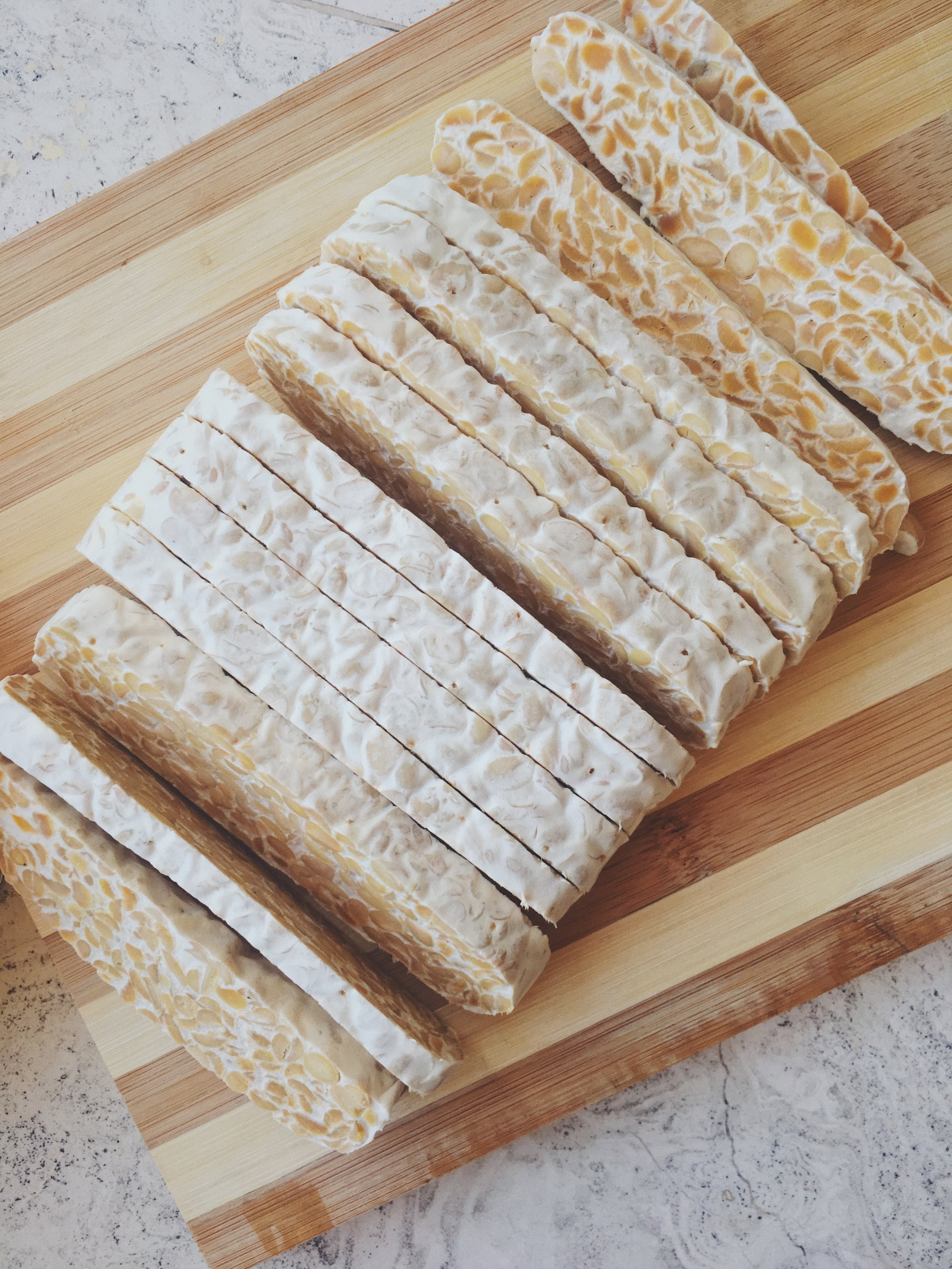Miso Tahini Marinated Tempeh
“Natural forces within us are the true healers of disease.”
For millions of years humans and bacteria have co-existed and have depended on one another for survival. Think about the symbiotic relationship between those little birds who feed on ticks on the backs of elephants and zebras. The larger animals benefit as they now do not need to worry about ticks (and are warned of nearby predators by the shrill bird's cries!) while the birds get a tasty takeout meal.
The human relationship with bacteria is similar. This complex, symbiotic relationship reflects our planet's biological relationships but on a much smaller scale.
Eating fermented foods results in the creation of conditions in which naturally occurring organisms thrive and proliferate. And by eating a variety of fermented foods, you promote diversity among microbial cultures in your body. And we all know biodiversity is a good thing for the survival of large eco-systems. This same principle is important at the micro-level too, that is, within our bodies. We can call this microbiodiveristy. Our bodies are little ecosystems that can only perform at their best when populated by diverse species of microorganisms and bacteria.
The bacteria inside of us function on four different levels for the human body.
Regulates inflammation - Inflammation can be regulated, to a large extent, by our microbiome (the bacteria in our body). Western medicine often only looks at treating the inflammation itself rather than the underlying cause.
Maintains intestinal integrity - Think of your intestines like a fly screen. It can let in all the nutrients (vitamins, minerals, trace elements, fatty acids etc) your body needs to function. But if you have holes in the fly screen caused by bad-bacterial overgrowth, dairy, meat, sugar, alcohol, stress and more, you are going to have some nasty things filtering into your bloodstream that you don't want! "Leaky gut syndrome", "translocation" or "intestinal permeability" is what its called. All of those unwanted, big, chunky particles that were not designed to be in the bloodstream cause the immune system to attack them. Bacteria in fermented foods maintain integrity of the intestine wall by ensuring only nutrients needed by the cells move into the bloodstream.
Manufactures important nutrients and molecules for the brain - If you're hungry you're in a bad mood, right? So surely it makes sense then to conclude that your brain is nourished by the food you eat - which is then broken down, absorbed and circulated. A healthy digestive system = a healthy and happy brain! But it goes one step further. The bacteria in your gut manufacturers brain-specific chemicals. Around 95% of your serotonin (the "happy" neurotransmitter) is made in the gut! Personal side note: I didn't know what happiness felt like until I started eating fermented foods. I felt at once energetic and bouncy as well as connected and grounded. I felt alive.
They assist in the digestion and assimilation of nutrients from food - Do you ever feel you eat healthily but are not fully reaping the benefits? Maybe you still feel lethargic, or you are not developing muscle mass you desire, or maybe you suffer from acne despite putting all the measures in place to #eatclean and #trainmean. This could be due to the fact that you are simply not digesting and absorbing the food you eat. The bacteria in our digestive tracts create an abundance of enzymes that help break down and digest our food. By establishing a well-balanced microbiome we can significantly improve the amount of goodness we are able to absorb!
So then, what is fermentation? It is a natural, traditional method of preserving and maintaining the health benefits of raw food, boosting its nutritional value, and delivering deliciously complex and balanced flavours.
Sure, fermented foods may seem a bit intimating at first. Kimchi and sauerkraut? That stuff looks a little freaky. Kombucha? How do you even pronounce that? Coconut kefir? Ok, you've lost me. Miso paste? Like the watery soup? Tempeh? Sorry, what are you going on about? But slowly these foods are becoming more and more popular in health stores, on brunch plates and in sushi burritos.
Tempeh is one of my favourite fermented foods. It has a slightly earthy smell but like tofu, it takes on any flavour. You can marinade, steam, fry or bake it. It has meatier texture than tofu and is packed to the brim with protein (and of course, probiotics).
This is a new favourite recipe on mine. It's been adapted from my Marinated Almond Butter Tempeh (Or Tofu) recipe but is more ferment-y as I added miso paste to the mix. I hope you enjoy the amazing probiotic nutrition from this meal. Stay healthy folks!
PS: If you are interested in learning more about fermented foods, Sandor Katz of Wild Fermentation is your guy! He is my inspiration on all things fermented-related.
Ingredients
70g tempeh
3 tbsp tahini
2 tbsp maple syrup
2 tbsp liquid amino acids (or soy sauce or tamari)
1 tsp miso paste
1/2 tsp apple cider vinegar
1 tsp chili flakes
1 - 2 tbsp water
Method
1. Slice your tempeh lengthways and place in a shallow dish.
2. Mix the ingredients for marinade until it reaches a smooth consistency. Add a bit of water to thin it out.
3. Pour the marinade over the tempeh and place in airtight container in the fridge overnight (or for a few hours).
4. When you are ready to cook your tempeh, turn on the oven to 180 degrees Celsius.*
5. Place the tempeh slices on a tray that has been lined with tin foil or baking paper.
6. Bake for 12-15 minute. Then turn them over and bake for another 5 minutes.
7. Serve immediately. Leftover tempeh (if you have any will last for 2-3 days).
to serve
Mix together tahini, water and lemon juice for a quick side dip
Lemon juice, squeezed
* Frying the tempeh with a bit of coconut oil is also a delicious alternative to cooking it!



